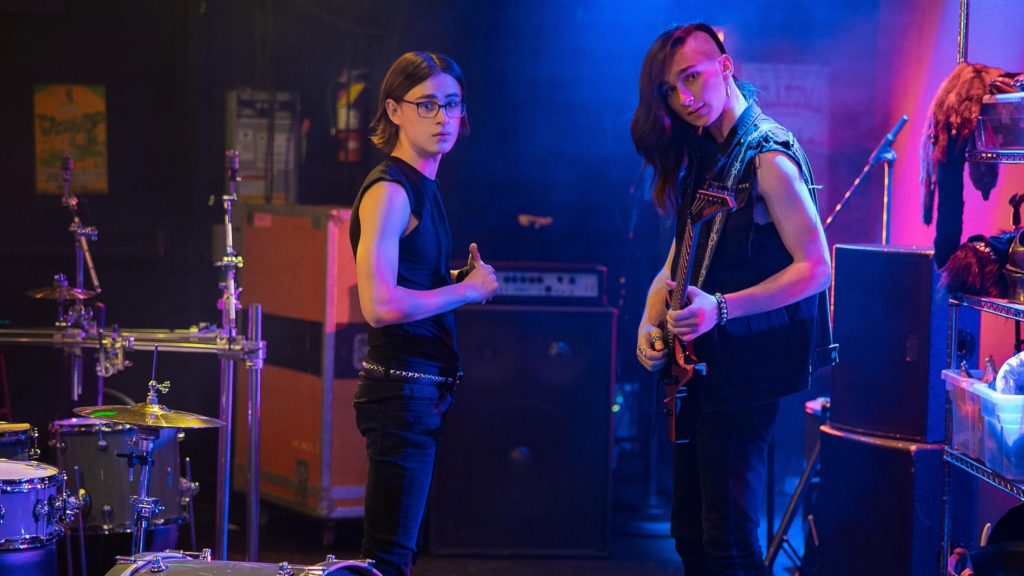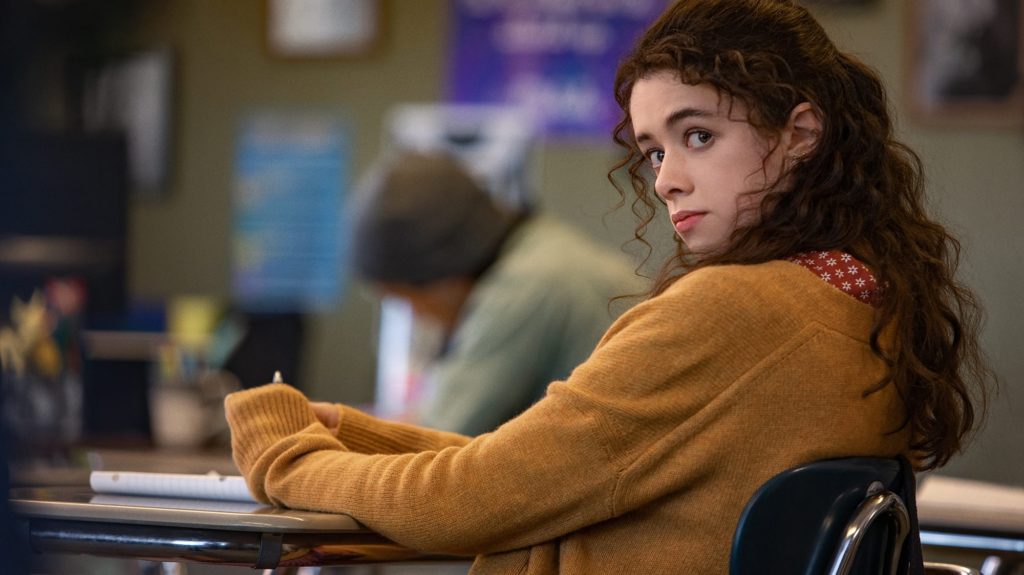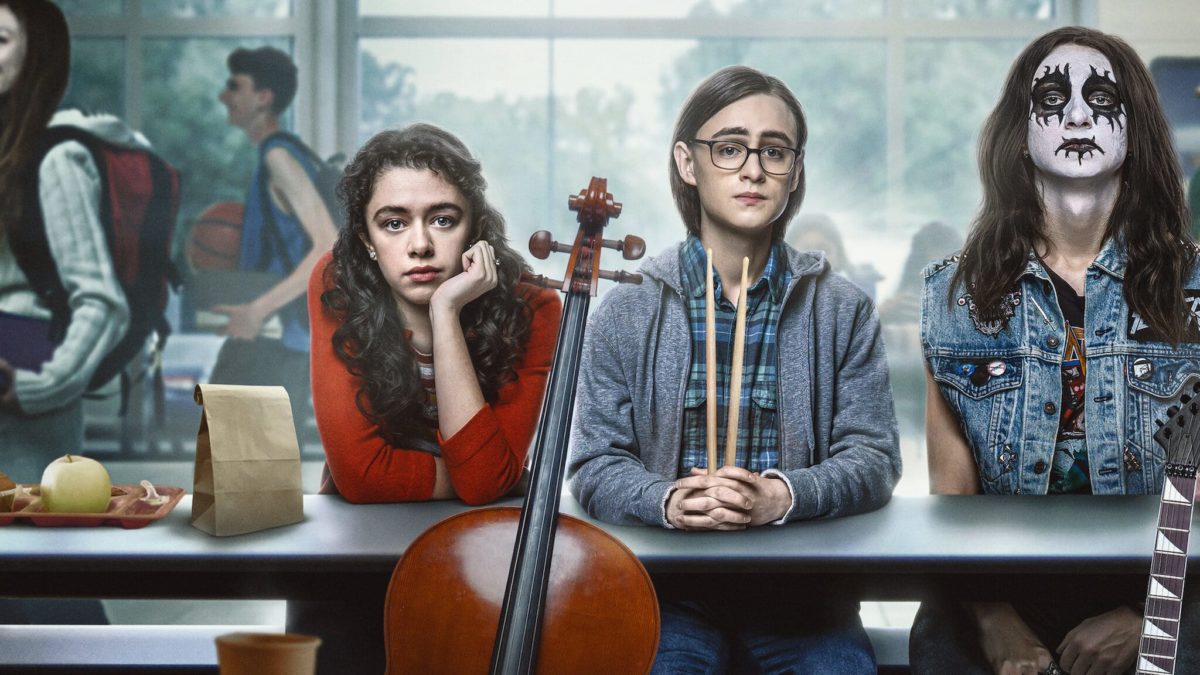Maybe I’m too streaming TV-brained, but something about Metal Lords’ structure just feels wrong. It’s trying to be a feature length film, but I would wager significant sums of money it was written to be a TV show. Mind you, I’m not really complaining. More shows should be movies. But the point stands that everything about Metal Lords feels like it was hastily trimmed from about eight 30-minute episodes into a barely functional 97-minute narrative. All the stuff that makes TV shows specifically good in comparison to movies — the abundance of little moments that build our understanding of the characters and their relationships, creating the feeling of an ongoing and lived-in world — seems to be the reason that Metal Lords exist, would have drastically improved Metal Lords, and yet is totally is missing in the name of progressing the narrative.
Pretty much all of the beats are chunked out into 2-4 scenes that would place neatly into a few episodes of a streaming-style serialized coming-of-age show. You know, the kind that gets solid reviews, entertains saps like me for a few hours, and gets promptly canceled. (See: Everything Sucks!) Major portions of the plot are missing, as if someone, perhaps the writer (Game of Thrones’ D.B. Weiss) or editor, just assumed the audiences could fill in the blanks. I want those blanks, damn it!
For example: In one scene, Kevin (Jaeden Martell) declines to tell his best friend Hunter (Adrian Greensmith) that he lost his virginity because he knows it will upset him. Cut to a few scenes later, Hunter is acting like Kevin has a band-ruining “Yoko.” Sure, we have sufficient info to know Kevin’s secret eventually leaked, and we’re spared a technically unnecessary scene, but there is a notable gap in our understanding of both characters, now. How exactly did Hunter find out? What did he do in response? What is the first thing that Kevin said? Was it measured, or blunt, or boastful, or indirect? Why deprive us of those rich moments that actually inform the characters and their dynamics?

In spite of being almost all story and very little organic character growth, Metal Lords has a rambling cadence to it. A shapelessness. There is the unifying thread of longtime best friends Hunter and Kevin forming a metal band to compete in the upcoming Battle of the Bands, but it follows lots of narrative side streets to get there. Kevin falls for cellist Emily (Isis Hainsworth) and tries to talk Hunter into letting her join the band. Hunter suffers through a series of degrading humiliations that are 75% directly self-inflicted, like when he punches a bully to take out some aggression, and 25% indirectly self-inflicted, like when his gatekeeping obsession with metal scares off other musicians who could offer some real fraternity and connection.
I have a lot of mixed-tilting-negative thoughts on the film, the script in particular, but one area where Metal Lords unambiguously shines is the performance of the “teen” actors. Though only one of the crew, Jaeden Martell was actually younger than 20 when this debuted, almost the entire cast actually feel like high schoolers, a rarity in films like this.

Emily is perhaps the film’s most intriguing character, mostly because Hainsworth gives the most intriguing performance. I am eternally grateful that the crew let her speak in her Scottish accent; it adds tremendous color to her charisma that would have been eradicated had she stumbled through a stiff American accent (see: Emma Watson in The Perks of Being a Wallflower). Even when the story rushes the character’s plot points about going off mental health meds, Hainsworth lends Emily terrific vitality and shading with little gestures and expressions. She has some great reaction faces and lovely chemistry with Martell, who is solid as the saltine but likable protagonist.
Greensmith offers an impressive and challenging performance as the deeply unpleasant Hunter. I’ve known people like Hunter in my life — big heart deep down, buried beneath layers of off-putting personality traits and alienating social habits, exacerbated by bad mental health, unstable life circumstances, and a short fuse — and they tend to be very difficult to spend extended periods of time with. Greensmith captures this quite well, refusing to sand off too many of Hunter’s edges. Hunter also suffers from the film’s aggressive narrative trimming; he would have benefited more than any other character with a little more nuance and depth that we could have seen if this had been a show rather than a film.
Thankfully, Metal Lords absolutely nails the ending. Like School of Rock before it, it climaxes with a genuinely great musical performance that is actually performed by the kids (or is a good enough fake of such that it didn’t bother me). The finale is an adrenaline-pumping and unflinching payoff on the film’s obsession with metal music.
Metal Lords not a coming of age movie for the annals, not even one of the best of the year, but with its strong performances and rousing finale, it’s a decent enough watch if you like get-the-band-together comedies. Just make it in the right medium for story next time, please.
- Review Series: 2022: Year in Film
Is It Good?
Nearly Good (4/8)
Dan is the founder and head critic of The Goods. Follow Dan on Letterboxd. Join the Discord for updates and discussion.

